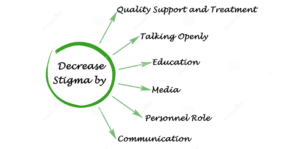Ever seeking the “edge” in early recovery a decade ago I took a real interest in both physical diet and digital “diet” (more of that later in 2020). I tracked down a couple of books about eating healthily, something I had not done whilst drinking and using. The best of these Eating For Recovery by Molly Siple informed my eating for the first year or so in recovery.
I was delighted to see our friends at ICAAD run blog posts at the end of 2019 concerning Food as Medicine. It seems that functional medicine and the benefits of diet and supplements on good mental health and general well being are being taken increasingly seriously.
The way that food can act as a medicine goes beyond simply eating your “5 a day”; there is a strong link between the food we eat and our mental health – Araminta Jonsson ICAAD blog
This in turn reminded me of a really useful “essay” that was shared with us a couple of years ago by a retired Doctor (psychiatrist) friend intended as a guide to useful supplements to complement healthy eating to support health, with a particular emphasis on supplements that may be beneficial for those in early recovery as well.
Attention to diet and supplements could really help support a healthy recovery.
Our (retired) Doctor writes;
“VITAMIN B3 (NIACIN) Niacin is one of the large group of B vitamins (the word vitamin derives from ‘vital amine’ and refers to something the body needs for survival but which it cannot manufacture sufficiently itself) the deficiency disease of which is Pellagra, characterised by Diarrhoea Dermatitis Dementia and Death! Using higher than needed for survival doses of natural things like vitamins has been around for a good many decades, although rigorous evidence for efficacy is limited, partly because there is no money in it for Big Pharma. Dr Abram Hoffer was the first one to flag up its use in alcoholics and he knew Bill Wilson, co-founder of AA, who recommended it to all alcoholics. We now know Niacin is needed to make NAD (Nicotinamide Adenine Dinucleotide in case you are interested) which is a vital chemical in every cell of the body. In simple terms NAD is the chemical which converts food energy into cell energy; levels of NAD also regulate enzymes involved in DNA repair, so Niacin has a massively important role to play in our health and survival.
Intravenous NAD can have a hugely helpful effect in alcohol and sedative drug detoxification, and in reduction of cravings and of anxiety, but it is expensive and cumbersome to give, so giving very high doses of oral Niacin is a cheap and simple next best thing.
There is one mildly annoying side effect of Niacin, the flushing reaction. Some 15 to 30 minutes after the dose your face, neck, upper chest and upper arms go red as a beetroot, with a slight burning sensation, also on the scalp. This is entirely harmless and passes off quite quickly, the body adapts to it swiftly and after a few days it doesn’t happen at all. In order to minimise it the dose regime is incremental. Confusingly it is possible to buy ‘non-flush’ Niacin which is a chemical variant, but what evidence there is supports the use of ordinary Niacin.
Dosing regime: Start on 100 mg three times daily with food. Once the flushing reaction is negligible (usually 2 or 3 days) increase to 200 mg three times daily. Continue doing this, increasing the dose every 2 or 3 days, until you reach 500 mg three times daily. At this point some people stop increasing the dose, but I think it is better to push on to 1000 mg three times daily. I have found that jumping from 500 mg to 1000 mg three times daily in one go is perfectly ok re the flushing reaction, but some people prefer the slow route via 600, 700 etc.
I personally get Solgar Niacin which comes in 100 mg and 500 mg capsules, but as far as I know any brand is fine
VITAMIN B8 (INOSITOL) Inositol can actually be manufactured in the body so may be declassified as a vitamin. There is no defined deficiency disease of which I am aware. Inositol in high dose seems to have a remarkable effect on anxiety and obsessional thoughts. There is quite good research evidence to support it (google ‘inositol and anxiety’ if interested). The benefits can occur in all recognised anxiety disorders, Generalised Anxiety Disorder, Panic Disorder with or without Agoraphobia, Social Anxiety Disorder, Post Traumatic Stress Disorder and Obsessive Compulsive Disorder. Side effects are almost non-existent. Sometimes there is a bit of abdominal discomfort and slightly loose bowels in the first few days. Inositol comes in capsules, but probably better is the powder form which can be mixed with water or juice. There is a good brand made by Jarrow.
Dosing regime: The usual dose for anxiety disorders is 6 grams twice daily. For OCD a dose of 18 grams daily is recommended, which is best done as 6 grams three times daily but some people did 9 grams twice daily.
FISH OILS (OMEGA 3 FATTY ACIDS) Omega 3 fish oils, comprising EPA and DHA (I will spare you the full names) are essential for brain function and neuroreceptors as well as many other things in the body, and a typical rotten diet may under provide them. For vegans it is possible to get EPA and DHA from other sources, for example flax seed. There is no particular link with addiction, but brain health generally, neurological and psychological, depends on them. I have found patients with low levels of depression and bipolar type 2 seem to do well.
Dosing regime: There are now a zillion different products available, some with things that are less important such as Omega 6 or Omega 9 fish oils and many with far too low doses. The labelling is confusing, the key being in the very small print on the back of the bottle where the dose of EPA and DHA per capsule is given. I tell people to have a minimum of 1000 mg of EPA and about 700 mg of DHA daily, the more adventurous (and wealthy!) taking twice this amount. One brand, not at all the only one, is Morepa. Two capsules daily of Morepa Platinum is a good basic (also without mercury and other poisons in the marine food chain), so if buying another brand check the number of mgs which should be the same as or more than what is in two Morepa Platinum capsules. I know Revital sell Morepa or you can get it more cheaply online via Minami nutrition. With Omega 3 fish oils the dose does not have to be exact.
VITAMIN D3 (CHOLECALCIFEROL) Vitamin D is made by sunlight on the skin and absorbed from various foods (it is a fat soluble vitamin). I did a study at my psychiatric hospital between March and September, ie longer days, some years ago and found that over 90% of patients had sub optimal levels. There are a wide array of health consequences of this, one of which is depression. In my view everyone should take a supplement, I even found low levels in a patient living in Egypt. The more obsessional among you can buy a kit (I think Revital sell it) which can measure Vitamin D levels in the blood from a pin prick.
Dosing regime: A safe dose is 2200 international units (55 mcg) daily, although more might be required transiently if the levels are very low. Like other fat soluble vitamins, too much Vitamin D can be a bad thing.
PROBIOTICS & PREBIOTICS The bacteria in the gut form a vital part of the functioning of our system. Recent research has shown that anxiety, depression and addiction can be strongly affected by the balance of ‘good’ and ‘bad’ bugs in the gut. Did you know that 95% of the body’s Serotonin and 50% of its Dopamine is found in the abdomen, not the brain? Maintaining a healthy gut bacterial balance is helped by nutrition primarily. Prebiotics are foods and some chemicals that nourish the good bugs, probiotics are the actual bugs themselves. In the future we may have ‘Psychobiotics’ instead of Prozac et al, specifically targeting certain psychiatric disorders!
Dosing regime: This is an area on which I am definitely not up to date. Foods such as sauerkraut, garlic, raw onions, avocados and bananas are all good. Loads of probiotics are around, most of which get killed off by the hydrochloride acid in the stomach. Nutrizing make a good one, two capsules daily. Also one of the best, if you can get it is Kefir, made from goat, cow or coconut milk.
I think that’s enough for now. I could bang on about other vitamins. A good B complex all rounder is wise as B vitamins like to be absorbed together. I personally take high doses of Vitamin C too.”
Whilst there should be no adverse side effects from using these supplements as directed allergies and individual reactions should be considered.
All supplements mentioned could be considered as such and be included along with a healthy balanced diet of fresh produce, with less sugar and processed foods.
Please note this is not a ‘medical’ recommendation by ORA or indeed by our friends. Anecdotally many people have reported the various supplements listed as being helpful.
Original text by Dr Mark Collins (Retired)





